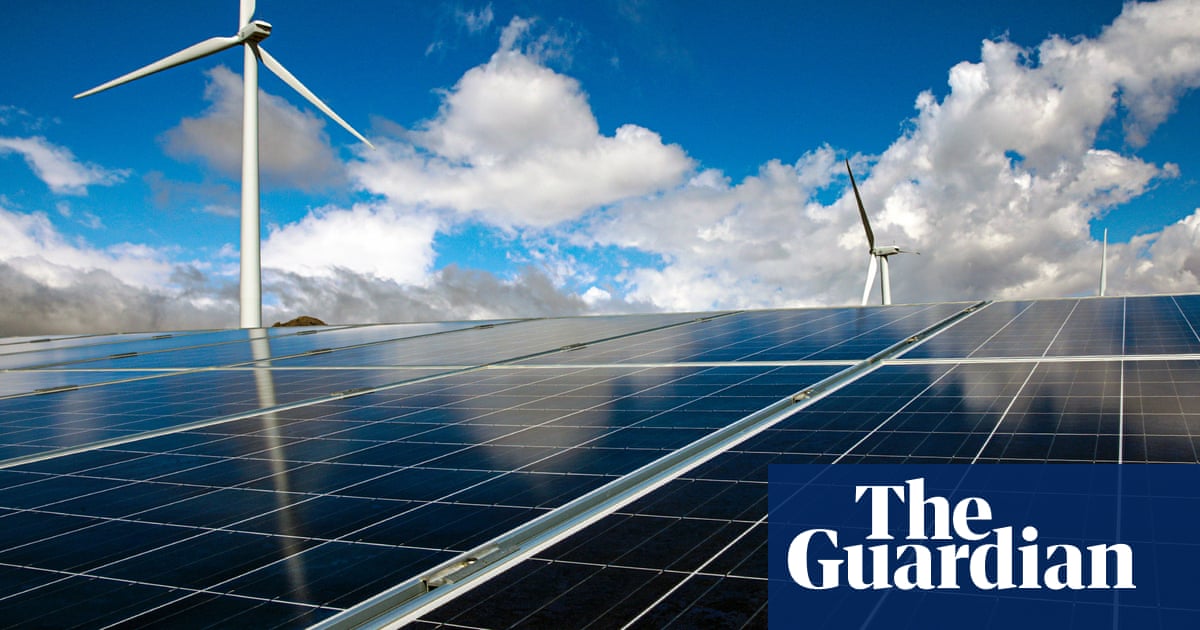Renewable energyin the US has surged to unprecedented levels, with the combined power generated bysolar,windandgeothermalmore than tripling over the past decade, according to a new report by a network of state environmental groups.
The growth has slashed harmful greenhouse gas emissions, made the nation’s energy system more resilient and prevented thousands of premature deaths from power plant pollution, according to thereport by Environment America.
But this progress faces increasing resistance asDonald Trumpin his first 15 weeks in office has begun todismantle federal policies and spendingaimed at easing the climate crisis.
It’s all happening at a time of heightened concern among environmentalists. Despite an international accord to lower greenhouse gas emissions, the atmosphere now contains record levels of heat-trapping gases. All 50 states have warmed since the first Earth Day in 1970, according to anew analysis by Climate Central, an independent non-profit group that researches and disseminates information about the climate crisis and its effects.
Among the highlights of the Environment America report:
The amount of solar energy produced in 2024 – enough to power 28m homes – was nearly eight times higher than a decade earlier.Solar powerproduction increased 27% from 2023 to 2024.
Wind produced even more energy – enough to power 42m homes in 2024. The amount of power from wind has more than doubled over the past decade.
Wind, solar and geothermal energy accounted for 19% of all retail sales of electricity last year, according to the federal data used to produce the report.
The amount of utility-scale battery storage in the US grew 63% from 2023 to 2024 – and a more than 80-fold increase over the past decade.
Nearly 3.3m electric vehicles were on US roads at the end of 2023 – a 25-fold increase from 2014. The number of electric vehicle charging ports, meanwhile, grew to more than 218,000 at the end of 2024 – six times more than there were in 2015 and a 24% increase from just the year before.
More than 1.5m plug-in electric vehicles were sold in 2024, an increase of more than 7% over the previous year, according to theArgonne National Laboratory. Nearly 300,000 new electric vehicles were sold in the US during the first quarter of 2025 – an 11% increase over the same period last year,Kelley Blue Book datashows.
“The growth of these clean energy technologies is now clearly benefiting people in all 50 states, and they’re really providing the building blocks of a clean energy system free from dirty and inefficient fuels,” said Johanna Neumann, senior director of the Campaign for 100% RenewableEnergy, which is led by Environment America. “And the more that we can accelerate the progress that we’ve seen, the better it’ll be for our health and for our environment.”
Sign up toDown to Earth
The planet's most important stories. Get all the week's environment news - the good, the bad and the essential
after newsletter promotion
Most of the states that have seen the biggest increases in wind, solar and geothermal energy over the past decade are in the south – and most are Republican states, according to a Floodlight analysis of the federal data used in the Environment America report.
Some of those states, including Mississippi and Alabama, still rank low in the total amount of renewable energy produced. But other right-leaning southern states, including Florida and North Carolina, now rank above most others in terms of the total renewable energy generated.
For those concerned about the climate crisis, however, a new analysis points to a more worrisome sign: almost $8bn in investments – including 16 large-scale factories and other projects – were canceled, closed or downsized in the first three months of 2025, according to thereport by E2, a nonpartisan group of business leaders who advocate for sound environmental policies.
Likely contributing to the cancellations: market uncertainty and the debate in Congress over repealing tax credits and other incentives for clean energy projects. The $7.9bn in investments withdrawn this year are more than three times the amount canceled over the previous two years, the E2 report notes.
“Clean energy companies still want to invest in America, but uncertainty overTrump administrationpolicies and the future of critical clean energy tax credits are taking a clear toll,” E2 spokesperson Michael Timberlake said in a statement.
The Inflation Reduction Act, Joe Biden’s massive climate law, extended renewable energy tax credits until at least 2032. Whether the Republican-controlled Congress will eliminate thosetax creditsis unclear.
“I think that market certainty has been stripped away for many of these technologies right now, and they’re feeling uneasy,” Neumann said. “And so it’s not surprising to me that we’re seeing a retraction in investment.”
Floodlightis a non-profit newsroom that investigates the powers stalling climate action.
